Early College High School
Tuition-Free Model Blends High School and College Coursework
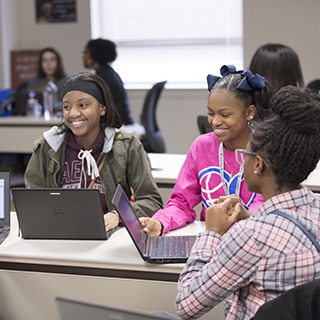 Early in 2010, Prycilla Luna, a Lake Worth eighth-grader, was summoned to her middle
school office. She wasn’t in trouble, but instead heard about a new educational opportunity
that neither her parents, nor even her older siblings, could have imagined—an early
college high school.
Early in 2010, Prycilla Luna, a Lake Worth eighth-grader, was summoned to her middle
school office. She wasn’t in trouble, but instead heard about a new educational opportunity
that neither her parents, nor even her older siblings, could have imagined—an early
college high school.
She could go as a freshman to Marine Creek Collegiate High school at TCC Northwest, where she and classmates would begin with high school courses and then gradually integrate into the college program. As juniors and seniors, they would be in college classrooms along with regular TCC students. After four years, if all went well, they would earn both a high school diploma and an Associate of Arts degree within a few days of each other.
What’s more, it would be free, with TCC waiving tuition and the school district furnishing books.
There was a downside. Luna would be leaving many friends behind and would miss the traditional high school experience—football, pep rallies and the class musical. She admitted to having been skeptical.
In the end, I was willing to give up anything to get ahead.
Prycilla Luna
Fast forward to May of 2014. Luna is sitting, “a bit scared,” at TCC’s massive commencement ceremony, waiting to walk across the stage and get her college degree. She would enter Abilene Christian University that fall as an 18-year-old junior.
Luna’s early college high school (ECHS) was only the beginning. Before she had even started her freshman year, other ECHSs were in the TCC pipeline, heeding former Chancellor Erma Johnson Hadley’s declaration in April 2010 that every TCC campus should have one. In 2012 TABS, the Texas Academy of Biomedical Sciences, opened at TCC Trinity River through a partnership among TCC, the Fort Worth ISD and the University of North Texas Health Science Center. It was followed by the Grapevine-Colleyville Collegiate Academy on TCC Northeast in 2013, the Arlington Collegiate High School on TCC Southeast and the Everman Collegiate Academy, affiliated with TCC South, both in 2014. TCC South got its own campus-based school with Fort Worth ISD in 2015 and in 2016, opened the Crowley Collegiate Academy. The latest addition in 2017 was the Mansfield Early College High School, housed at Timberview High School and affiliated with TCC Southeast.
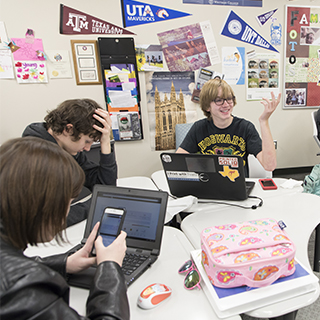 These eight schools have served more than 3,000 students, the vast majority of whom
have two common characteristics. First, said Arlington CHS teacher Jennifer Fuller,
they’re “scared to death”—not so much from the newness of their surroundings as from
a fear of failure. “They’re afraid they’re going to drop out,” she said, “that they’ll
disappoint people.”
These eight schools have served more than 3,000 students, the vast majority of whom
have two common characteristics. First, said Arlington CHS teacher Jennifer Fuller,
they’re “scared to death”—not so much from the newness of their surroundings as from
a fear of failure. “They’re afraid they’re going to drop out,” she said, “that they’ll
disappoint people.”
Balancing that fear is a high degree of motivation, like Luna’s drive to succeed. “They have a better idea of what they want to achieve,” said Sean Milligan, assistant principal at Everman Collegiate Academy. “There are still a lot of questions, but they have made the commitment that college is in their future.”
Administrators know their incoming students will be apprehensive and take pains not to put too much on them too soon. Most employ a “bridge” program in the summer to help future classmates bond and to get a handle on each individual’s abilities. “We get a good outlook on where they stand, where their strengths are and where they may have weaknesses,” said Jamila Thomas, academic dean at Grapevine-Colleyville Collegiate Academy. “Based on that data, we will determine how many classes they will take and what options we might give them.”
Three schools—Everman, Crowley and Mansfield—have taken a different approach to reducing the fear factor. They have “schools within a school” that keep students in the traditional high school setting and able to participate in all the usual non-curricular activities. College courses are taught in the high school classrooms or, on a half-day basis, at TCC.
We believe our model provides more flexibility. We essentially hold their hands for the freshman and sophomore years, and that transition has provided a foundation so that when we do take the training wheels off, so to speak, culture shock is minimal.
Sean Milligan
That culture shock hits when the students find themselves at TCC in classrooms with the normal student population. “I remember taking my first college class,” Luna recalled. “I made a ‘C.’ I cried.”
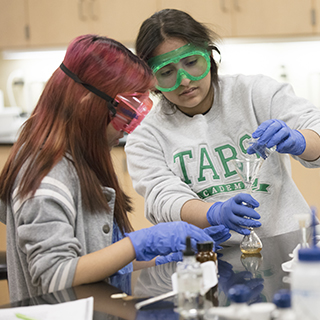 “That first semester in 11th grade is tough,” said Arlington CHS principal Ben Bholan.
“There are different balances. The professors aren’t on you all the time saying, ‘Hey,
remember you’ve got to turn this in.’ They must manage their own responsibilities.
But our kids, in the second semester of 11th grade, started catching on.”
“That first semester in 11th grade is tough,” said Arlington CHS principal Ben Bholan.
“There are different balances. The professors aren’t on you all the time saying, ‘Hey,
remember you’ve got to turn this in.’ They must manage their own responsibilities.
But our kids, in the second semester of 11th grade, started catching on.”
Indeed, they become such model students that TCC faculty tell Bholan they relish his students in their classes because they’re there every day, behave well and do what they’re supposed to do. “It’s really great to watch them mature,” he said, “especially after seeing them in ninth grade and thinking, ‘Oh my gosh, how are they ever going to do that?’”
On the whole, TCC’s early college high school students seem to have exceeded expectations. Arlington CHS students’ test scores are conspicuously above the school district average. About 80 percent of their seniors will receive their college degrees and virtually 100 percent will get high school diplomas.
“Some people in the community say, ‘Oh, you’ve got all the AP (advanced placement) kids, the smartest kids. Of course you’re doing well,’” Bholan said.
Actually, the Texas Education Agency, in establishing the early high school program in 2003, mandated that preference be given to first-generation-in-college students, those who lack access to college preparatory programs, those likely unable to meet college costs and those who participate in English as a Second Language programs.
These are kids who would be just average or sometimes below average at a traditional high school. If they weren’t here, most likely they would have dropped out. But they have so many people here who know them and support them that it makes a really big difference. They have the will and the heart, work hard, have the right attitude and believe they can succeed.
Ben Bholan
And so, on May 12, Daniella “Danny” Lopez—a senior at Marine Creek ECHS who originally was unsure she could complete the program, will sit up front at TCC’s graduation, reflecting on the last four years. “The people I’ve met here are so great and want you to do better, want you to go off and do something bigger,” she said. “Honestly, it’s meant the world to me.”
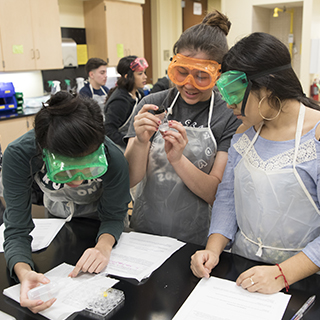

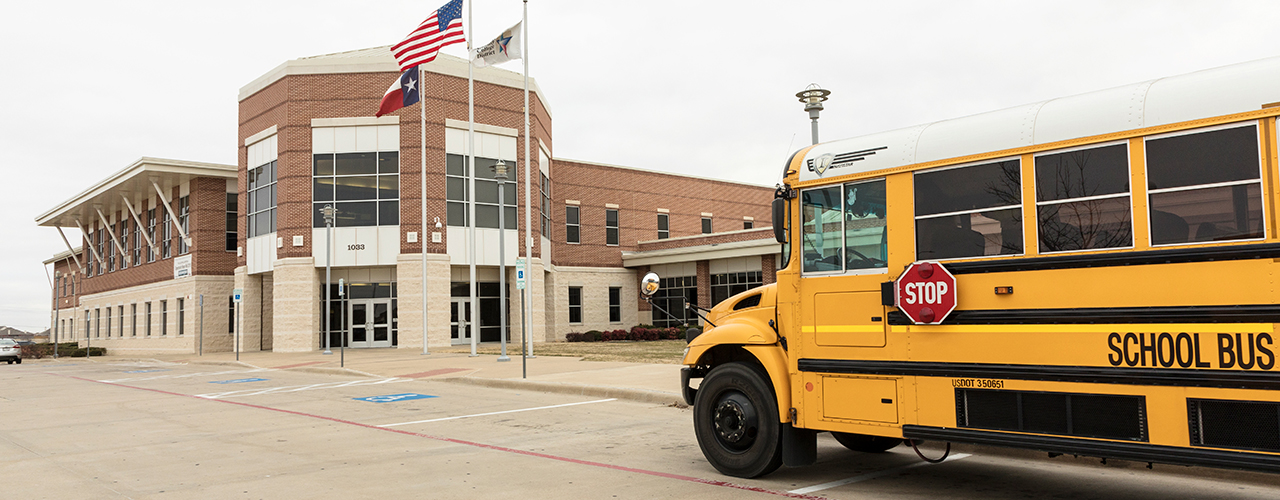
![//parameter[@name='author']](/magazine/assets/images/authors/bill-lace.jpg)